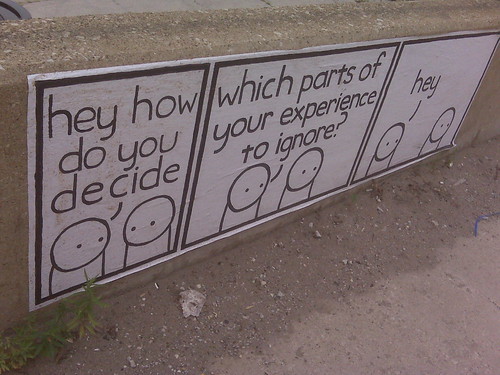 Rob is a music teacher friend of mine who works in the NSW Southern Highlands, and he dropped me an email this afternoon asking if I knew of any schools who were thinking about using iPads. His school is moving forward with an iPad trial and he was wondering what resources might exist that would help them avoid “reinventing the wheel”.
Rob is a music teacher friend of mine who works in the NSW Southern Highlands, and he dropped me an email this afternoon asking if I knew of any schools who were thinking about using iPads. His school is moving forward with an iPad trial and he was wondering what resources might exist that would help them avoid “reinventing the wheel”.
As it turns out, I’ve been seeing a lot of iPad related information lately so I thought I’d post a reply here on the blog rather than just reply to Rob in an email, just in case some of the information is of some use to others.
I’ll preface it by saying that I think there are a lot of things in education that could certainly use some reinventing, and maybe this is a good chance to do it. There seem to be a lot of schools looking at how iPads might fit in so it may be a little early to avoid the reinventing and instead take advantage of the opportunity to do some inventing. While there are plenty of lessons about 1:1 learning to be gained from the last 20 years of laptop use in schools (and we should leverage everything we’ve learned from that history) the iPad is a different enough device that it’s causing us many of us to stop and think about how we might do some reinventing of what it means for learners. I remarked to someone recently that it’s interesting that nearly every school implementing iPads is still referring to it as an “iPad trial“. We’re all trying to figure this out. With it’s unique form factor, light weight and slim design, the touch interface and thousands of apps to explore, the iPad seems like such an obvious fit in education, it’s just a matter of fitting where. It’s a classic “solution in search of a problem”. It seems apparent that it ought to be an ideal device for educational use, but nearly everyone is still hedging about with a “trial”, rather than just biting the bullet and going ahead with full scale iPad implementations. This “reinventing” isn’t a bad thing, because it means we’re thinking outside the box, looking for the right niche, trying to figure out how this clearly amazing little device will find the right fit in schools. Sometimes new wheels need to be invented.
We run a laptop program at my school and we had a meeting a few days ago to evaluate the progress of it. We all agree that students having their own device has caused some fundamental shifts in the way our kids learn, create and interact with content as well as the way teachers think about designing learning tasks. There’s no doubt that it’s a good – no, a great – thing and has opened doors to a different kind of learning for many of our students. Many students have remarked to me that the couldn’t imagine going back to the non-laptop days. It’s great to hear that, although I still don’t think we’ve really begun to leverage the full advantages of being 1:1. We’re still learning too.
But there are downsides to carrying technology around. The added weight of carrying laptops and textbooks (yes I know we should be able to get rid of textbooks altogether, and we will eventually, but change can be painful and we are still in transition on some of this stuff). The fragility of having a computer in your bag and the inevitable damage and breakages can be a problem. Laptop battery life is fine when the machines are new but gets steadily worse over time, which then opens a whole can of worms regarding charging once they can no longer get through a whole day on a single charge. Traditional laptops are fine, but if only they were lighter, thiner, more compact, more durable, with less moving parts and good battery life. Sound familiar? No wonder the iPad strikes so many people as an obvious solution in schools. It’s has so much of what we’re looking for in a device!
I love my Gen 1 iPad, but until the release of the iPad 2 I wouldn’t have entertained the original iPad as a serious contender in education. It was the classic debate between it being a “content consumption device” versus being a “content creation device”. I want kids to do far more than just consume content, I want them to create it, and iPad 1 lacked far too much in this area for me to take it seriously. However, with the recent addition of cameras, enough grunt to handle tasks like video editing and multitrack audio recording, display port mirroring and a number of other big improvements, it’s getting to the stage where it could be a contender for a student’s main computing device. Maybe.
I’m still hedging a little and saying “could be” a contender, because I think it still depends what you want to do with them. With an iPad as your primary computing device you’d still need to be able to live without Flash (which admittedly is becoming less and less of an issue thanks to HTML 5) and the limitations of mobile Safari and the very ordinary way it renders some pages. Safari doesn’t play nicely with our Moodle LMS because, being Webkit based,the browser don’t show the toolbar buttons in Moodle 1.x. I’m sure 2.0 fixes this, but right now, it’s a problem for us. I also find Safari does some weird things with forms and text fields. Overall, I’d really struggle with it as my main browser.
There are some issues with the way some third party iPad apps interact with school firewalls and, unless your school runs a transparent proxy, there are likely to be many apps that simply cant get through to the web. This is likely to be a problem. I also have doubts as to whether the pseudo-multitasking is really good enough to be used as your primary computing device, and there are plenty of time when I feel very unproductive because of it. Sometimes, I just want a “real” computer.
There’s also licensing issues to consider as Apple haven’t been very clear about just how apps can be shared and deployed on a school basis, as well as a lack of what you might call enterprise-level imaging tools. There are quite a few nuts and bolts issues like this that need to be thought through if they are to be used on a school-wide basis. Apple’s own view seems to be that iPads are not really an enterprise device, they are a personal device and they aren’t designed to be “managed” in the same way that laptops would be.
However, all that aside, there are still enough intriguing things about the iPad, and enough potential advantages, that I totally understand why schools are running “trials” to try and figure out just where the real limitations lie and just how they might be made to fit into a school situation.
So, with that little preamble of thoughts about the iPad, here are a few resources for Rob. Hope you find them useful, mate…
- Kerry Smith’s blog provides a list of schools running iPad trials in Australia – http://smik.posterous.com/ipad-trials-in-australia
- iPads for Learning, a website run by the Victorian government with information about iPad trials in Victorian schools – http://www.ipadsforeducation.vic.edu.au/
- Slide2Learn, a grassroots conference held in April for educators interested in sharing ideas about learning with iDevices – http://slidetolearn.ning.com/
- In Their Hands, an online document full of suggestions, ideas, app recommendations, as well as pedagogical models, and implementation advice. Seems like a worthwhile document to use as a starting point – http://asp-uk.secure-zone.net/v2/indexMobile.html?id=639/684/1619&lng=en#1
- There’s An App For That, a Virtual Staffroom Podcast episode I recorded with three teachers in schools running iPad trials. I think it’s worth a listen – http://virtualstaffroom.net/2011/02/vsr40-theres-an-app-for-that/
- A post by Ronnie Burt on The Edublogger about what can be learned from an exemplary iPad program – http://theedublogger.com/2011/03/11/what-we-can-learn-from-an-exemplary-1-to-1-ipad-program/
- There was a really interesting thread on the OzTeachers List earlier this month about iPads. It was started by Brett Clark (zedman350) and raised a great deal of passionate debate about what we should be looking for in school computing devices – http://lists.rite.ed.qut.edu.au/pipermail/oz-teachers/2011-March/thread.html (scroll down the page a little)
- I also hear that Trinity Grammar is running a fairly significant iPad project too, with all of their senior students now carrying the devices. Might be worth chatting to the Director of IT at the school… I think you know him. 😉 (For other readers, this just happens to be Rob’s brother)
Hope that helps a little. Let me know how it pans out for your school, and how that wheel gets invented. You might let Kerry Smith know too, and she can add you to that list of schools running trials.
CC Image: ‘iPad with Dandelion‘
http://www.flickr.com/photos/68217628@N00/4675262184

 This is an experiment. I’m using DragonDictate, a program for the iPad that lets you talk directly into the computer as it turns your words into text. A teacher at school today asked me about using dictation and word recognition software for her students that had trouble with learning.
This is an experiment. I’m using DragonDictate, a program for the iPad that lets you talk directly into the computer as it turns your words into text. A teacher at school today asked me about using dictation and word recognition software for her students that had trouble with learning. I was following a discussion on a mailing list today about the various internet blocking and filtering policies that different schools implement. Someone said their school was revising their fitering/blocking policy and wanted to know what others were doing. From the replies I saw, it seems that many schools are still running scared of what their kids might do on the web, and still block access to useful services like YouTube and Flickr, and pretent things like Facebook and Twitter don’t exist. Seems that even after 10 years, Web 2.0 is still a scary bogieman to many schools.
I was following a discussion on a mailing list today about the various internet blocking and filtering policies that different schools implement. Someone said their school was revising their fitering/blocking policy and wanted to know what others were doing. From the replies I saw, it seems that many schools are still running scared of what their kids might do on the web, and still block access to useful services like YouTube and Flickr, and pretent things like Facebook and Twitter don’t exist. Seems that even after 10 years, Web 2.0 is still a scary bogieman to many schools.